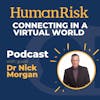Dr Nick Morgan on connecting in a virtual world

How can we make better connections when we're on virtual calls and webinars? My guest on this episode, Dr Nick Morgan is a speaking coach and writer who helps people to find their voice in a physical and virtual world. For personal reasons, that he...
How can we make better connections when we're on virtual calls and webinars? My guest on this episode, Dr Nick Morgan is a speaking coach and writer who helps people to find their voice in a physical and virtual world. For personal reasons, that he explains on the episode, Nick is on a mission to help people have better interactions with others. To find out more about his business visit https://publicwords.com/
Nick's book "Can You Hear Me? How to connect with people in a virtual world" was described by Harvard Business Review (who area the publisher!) as “your essential communications manual for twenty first century work”. I have to agree. You can find out more about it here: https://publicwords.com/can-you-hear-me/
Having been forced to pivot my Human Risk business (www.human-risk.com) from being mostly 'face to face' with some virtual work, into an entirely virtual business, I was looking for ways that I could learn to get better at my online interactions. Nick's book — which was published in 2018 — provided many answers and helped me to adapt. In our discussion, we explore Nick's story and what he's discovered in looking at how we interact.
In case you’re wondering what the human risk angle is here, let me explain. Since we’re required - and even when we’re not required, will probably want - to do more virtual communication than ever before, it’s important we become good at the skills we need in order to do so. As you’ll hear from Nick, those aren’t the same skills we need to communicate in person. If we don’t master these skills, then we risk being misunderstood and we risk misunderstanding others. As we know, misunderstandings can lead to conflict, confusion and even chaos.
So, if we want to avoid being part of human risk in action - or indeed if we’re tasked with managing it and want to help others avoid it - understanding how we can better communicate in a virtual world is a must-have, not a nice to have.
It's a subject I've covered before on the show and if you're interested in this area, I recommend the following episodes:
Hannah Thomas Uose on Zoom Trauma —https://www.humanriskpodcast.com/hanna-thomas-uose-on-zoom-trauma/
Professor Elizabeth Stokoe on Conversations — https://www.humanriskpodcast.com/professor-elizabeth-stokoe-on-the-science-of-conversations/
Jon Levy on Influence — https://www.humanriskpodcast.com/jon-levy-on-influence/




















